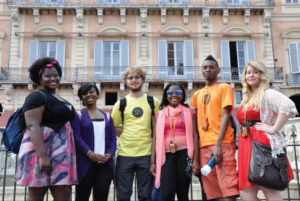Despite the fact that the benefits of studying abroad are well documented, studies revealed that only about 5 percent of the students who study abroad are Black.
Even as the programs tout educational, economic and emotional benefits, it’s clear that financial concerns and preconceived notions about studying abroad are discouraging Black students from expanding their education beyond America’s borders.
Experts in education will rarely hesitate to promote all the advantages that come with studying abroad, even if it’s just for one semester.
Studies revealed that students who study abroad typically garner a global understanding of economic issues, become well versed in a second language, take in aspects from a new culture, find new interests that could impact career choices in the future, are more likely to have a positive outlook on education and so much more.
The benefits are vast and they don’t stop with just the individual student’s well being. Students who study abroad frequently go on to maintain leadership positions that can help the advancement of their entire community.
This is precisely why experts are concerned about the low percentage of Black students actually studying abroad.
The Institute of International Education revealed that only 5 percent of the students who study abroad are Black.
This lack of global exposure for Black students could very well be a major cause of the lack of Black people in international careers and leadership positions.
Black lives matter protests didn’t just sweep America, they were sparked across the entire globe. This was a grim reminder that racism plagues Black communities all across the world and that leaders are needed on an international scale to help fight racism and push for equality even beyond America’s borders.
Studying abroad can also help Black students cut down on their expenses once they graduate.
It’s a surprising claim and something that would leave most college students scoffing in disbelief.
One of the main reasons Black students tend to stay away from studying abroad is concerns about what the international studies would mean financially.
Would they be able to afford to walk away from the job they have in the States? What about the extra income that would be needed to partake in certain experiences overseas? How would they come up with the thousands of dollars needed to even successfully enroll in a study abroad program?
The hefty fines and fees attached to studying abroad can certainly frighten students interested in the programs, but many of these students are often unaware of the scholarships and other financial aid tools that could help them pay for the trip.
The real twist in the student’s favor, however, is the fact that some countries offer secondary education at a much cheaper rate than their American counterparts.
The Atlantic points to German universities as an example. Universities in the country no longer charge tuition fees.

The possible economic and political advantages to getting more Black students to study abroad are noted in several studies, but some seasoned travelers say there are more benefits that aren’t necessarily quantified in numbers and statistics.
“As a black traveler, I seek liberation through exploration and find myself seeming freer, at least in mind and heart, on the road than at home,” Farai Chideya recently wrote in an article for The New York Times.
This by no means suggests that racism isn’t prevalent in other counties, but merely brings attention to the possible emotional benefits of traveling, especially for Black students.



